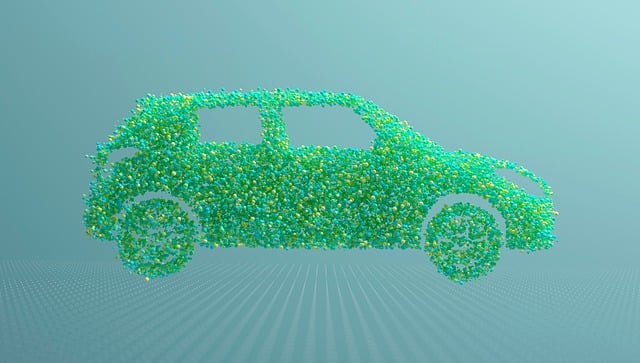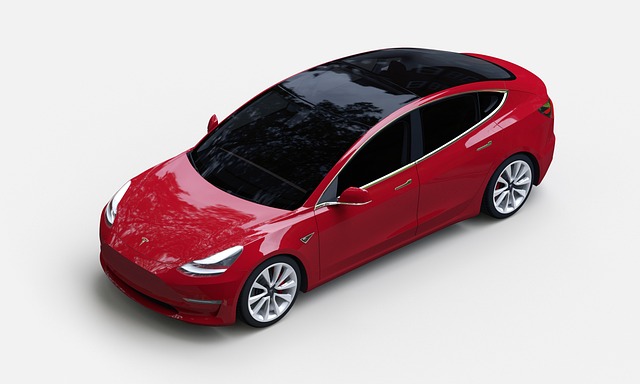Advanced battery technology, Efficient Energy Management Systems (EEMS), lightweight materials, regenerative braking, optimized aerodynamics, and interconnected vehicles drive the improvement of Select Sustainable Vehicles' range and sustainability. These innovations enable longer distances, reduce environmental impact, and make EVs more practical for everyday use and various sectors, transitioning from niche to mainstream markets.
The future of sustainable transportation hinges on electric car range improvements. In this article, we explore groundbreaking advancements pushing the boundaries of distance and efficiency for select sustainable vehicles. From enhanced battery technology and energy management systems to innovative materials, regenerative braking, streamlined aerodynamics, and smart charging networks – these developments are revolutionizing long-distance travel. Discover how these breakthroughs make electric cars a more viable option for those seeking eco-friendly mobility with extended ranges.
- Technological Advancements in Battery Capacity
- Efficient Energy Management Systems
- Lightweight Materials for Extended Range
- Regenerative Braking: Capturing Kinetic Energy
- Optimized Aerodynamics for Reduced Drag
- Networked Vehicles: Smart Charging and Routing
Technological Advancements in Battery Capacity

The continuous evolution of battery technology is at the heart of significant improvements in electric car range. Modern batteries are designed with enhanced energy density, allowing them to store more energy within a smaller form factor. This breakthrough enables longer driving ranges on a single charge, making electric vehicles (EVs) increasingly attractive for long-distance travel and everyday use. For instance, the latest generation of lithium-ion batteries offers capacities exceeding 100 kilowatt-hours (kWh), a substantial leap from earlier models.
These advancements are not limited to passenger cars; they extend to various sectors, including sustainable delivery vans for green logistics, low-carbon motorcycles for daily riders, and hybrid construction equipment for eco-building. Energy-efficient lighting for garages and e-mobility solutions for smart cities also benefit from these technological leaps, collectively contributing to a more sustainable future. Select Sustainable Vehicles are no longer confined to niche markets; they’re becoming the norm as battery technology continues to improve, paving the way for a greener and cleaner transportation network.
Efficient Energy Management Systems

The advancements in Efficient Energy Management Systems (EEMS) are revolutionizing the electric car industry and making sustainable vehicle choices more appealing to consumers. These systems optimize energy usage, extending the range of electric vehicles (EVs). By efficiently allocating power, EEMS ensures that drivers can travel farther on a single charge, reducing range anxiety. This technology plays a crucial role in encouraging the adoption of green transportation infrastructure development, as it addresses one of the primary concerns of potential EV owners.
In urban areas, water-cooled engines for efficient driving and electric bike sharing programs are gaining popularity, further promoting sustainable mobility options. Additionally, electric shuttle buses for tourist attractions offer an eco-friendly way to explore popular destinations while reducing carbon emissions. These innovations highlight how EEMS contributes to a holistic approach to enhancing EV range and fostering a greener future for transportation.
Lightweight Materials for Extended Range

The automotive industry is witnessing a significant shift towards lightweight materials to enhance electric car range. By reducing overall vehicle weight, manufacturers can increase the distance these vehicles can travel on a single charge, making them more viable for daily use. This trend aligns perfectly with the global push for sustainable transportation planning in urban development and the need to reduce carbon emissions across various sectors, including emergency medical services that are increasingly adopting hybrid and electric vehicles.
Lightweight materials such as advanced aluminium alloys, carbon fibre composites, and lightweight steels are being incorporated into vehicle construction. These materials offer superior strength-to-weight ratios compared to traditional steel, allowing for slimmer, more efficient battery packs and overall vehicle design. Furthermore, the use of biodegradable car waxes and polishes can contribute to a more eco-friendly production process, mirroring the broader trend in sustainable aviation fuels that aim to make flights cleaner. Select sustainable vehicles equipped with these innovations are poised to redefine mobility, offering extended ranges and reduced environmental impact.
Regenerative Braking: Capturing Kinetic Energy

One significant advancement in electric car range improvements is regenerative braking, a system that captures and converts kinetic energy back into electrical energy during deceleration. This innovative technology mirrors the way traditional vehicles use brakes, but with a crucial twist—it allows electric cars to recover valuable energy that would otherwise be lost as heat. By employing regenerative braking, select sustainable vehicles can extend their range, offering drivers increased confidence in navigating longer distances without worrying about running out of power.
This system is particularly noteworthy for its environmental benefits, aligning with the green car awards and recognition that many eco-conscious consumers seek. Moreover, as the infrastructure for solar-powered chargers for electric vehicles continues to expand, coupled with recycling programs for old cars aimed at metal salvage, regenerative braking further underscores the industry’s commitment to sustainability. Easy access to electric vehicle charging stations near me makes these improvements even more appealing, as they contribute to a greener future while enhancing the overall driving experience.
Optimized Aerodynamics for Reduced Drag

The design and engineering advancements in modern electric vehicles (EVs) have significantly contributed to improved range, making them more viable alternatives to traditional gasoline-powered cars. One such area of focus is optimized aerodynamics, which plays a crucial role in reducing drag and enhancing fuel efficiency. By streamlining the vehicle’s shape, engineers are able to minimize air resistance, allowing EVs to travel further on a single charge. This is particularly beneficial for select sustainable vehicles, as it means drivers can embark on longer journeys without worrying about range anxiety.
Moreover, the integration of innovative technologies like solar-assisted heating systems and even solar-powered charging buses in public transport is revolutionizing the way we think about EV range. These systems not only contribute to overall energy efficiency but also showcase a commitment to exploring green alternatives. For instance, hybride emergency medical services vehicles equipped with such technologies can ensure both optimal performance and environmental friendliness, demonstrating that sustainability and practicality can go hand in hand.
Networked Vehicles: Smart Charging and Routing

The future of electric mobility lies in interconnected vehicles that communicate with each other and the charging infrastructure, also known as networked vehicles. This smart technology revolutionizes how we charge our cars, optimizing both time and energy consumption. By sharing real-time data on battery levels and available charging stations, these vehicles enable more efficient routing, ensuring drivers can reach their destinations without range anxiety.
This interconnectedness also facilitates eco-friendly auto maintenance for long-term savings by enabling predictive servicing. Furthermore, as green logistics centers become more prevalent, networked vehicles can seamlessly navigate these efficient delivery hubs, contributing to the overall reduction of carbon emissions and recognition in green car awards. Carbon capture technologies play a supporting role by mitigating any residual emissions from vehicle operations, aligning with the global push for sustainable transportation solutions.
The future of electric car mobility looks bright with continuous advancements in technology. By enhancing battery capacity, implementing efficient energy management systems, utilizing lightweight materials, capturing kinetic energy through regenerative braking, reducing drag through optimized aerodynamics, and leveraging networked vehicles for smart charging and routing, we’re witnessing a revolution in Select Sustainable Vehicles. These innovations not only extend electric car ranges but also make them more environmentally friendly and cost-effective. As these technologies mature, we can expect even greater advancements, paving the way for a greener and more sustainable future on the roads.



